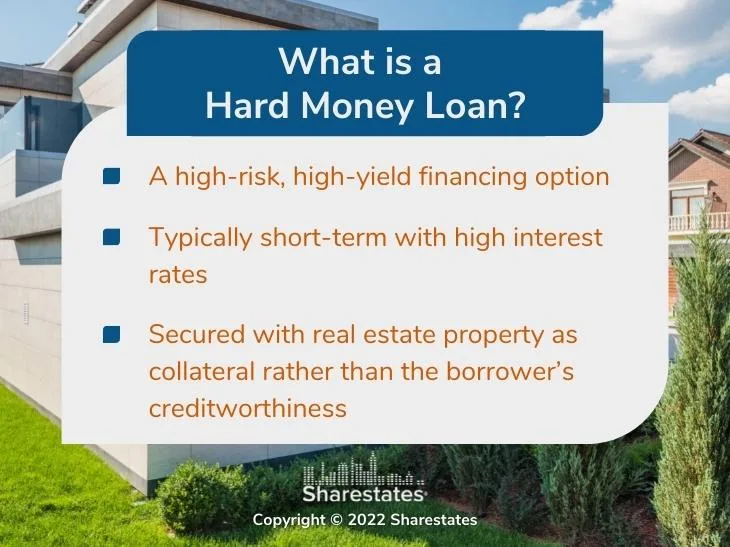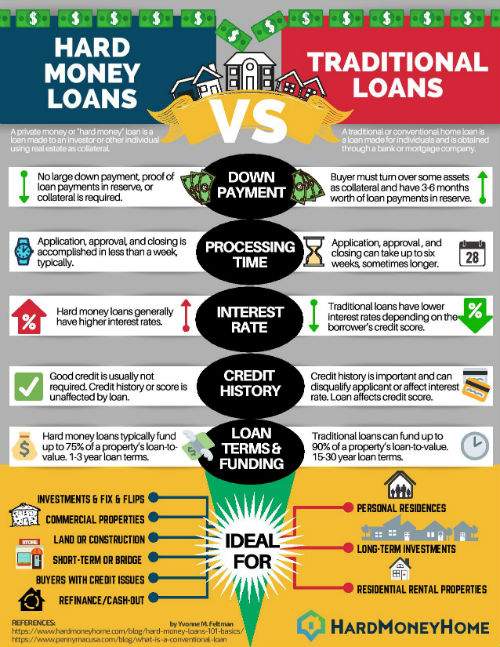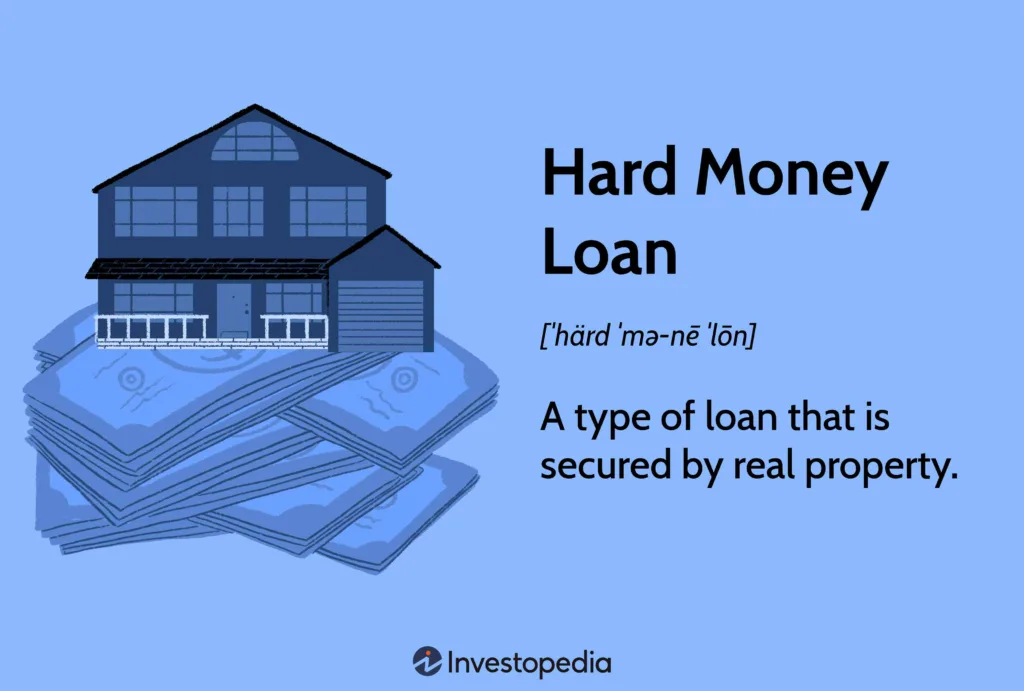Hard money loans, a type of loan often used in real estate investing, have gained popularity due to their unique features and quick funding process. However, before getting involved in this alternative lending option, it’s important to understand the associated risks. This article explores whether hard money loans are considered high-risk, shedding light on the factors that contribute to their perception in the loan market. By gaining insight into the potential risks involved, borrowers can make informed decisions when considering hard money loans for their financing needs.
Definition of Hard Money Loans
Explanation of hard money loans
Hard money loans are a type of financing that is often used in real estate transactions. Unlike traditional loans, which are typically issued by banks or credit unions, hard money loans are provided by private individuals or small lending institutions. These loans are secured by the value of the property being purchased, rather than the creditworthiness of the borrower. Hard money loans are typically short-term loans with higher interest rates and less stringent qualification requirements than traditional loans.
How they differ from traditional loans
The main difference between hard money loans and traditional loans lies in the criteria used to evaluate borrowers. Traditional loans rely heavily on a borrower’s credit history, income, and other financial factors to determine eligibility and loan terms. Hard money loans, on the other hand, focus primarily on the value of the property being purchased. The loan amount is typically based on a percentage of the property’s appraised value, known as the loan-to-value (LTV) ratio. Additionally, hard money loans are typically funded much faster than traditional loans, allowing borrowers to access funds quickly for time-sensitive investment opportunities.
Types of assets used as collateral
Hard money loans are primarily secured by real estate assets, such as residential or commercial properties. However, some lenders may also consider other types of assets as collateral, including land, multifamily properties, and even luxury items like yachts or aircraft. The specific types of assets accepted as collateral may vary depending on the lender and the individual loan circumstances. It is important for borrowers to understand the acceptable collateral options before pursuing a hard money loan.
Risk Factors in Hard Money Loans
High interest rates
One of the key risk factors associated with hard money loans is the higher interest rates compared to traditional loans. While traditional loans may have interest rates in the single digits or low teens, hard money loans often have rates ranging from 10% to 15% or even higher. This is because hard money lenders are taking on a higher level of risk by lending to borrowers with less-than-perfect credit or financial situations. Borrowers should carefully consider their ability to repay the loan with the higher interest rate when evaluating the potential risks and rewards of a hard money loan.
Short loan terms
Another risk factor in hard money loans is the relatively short loan terms. While traditional loans may have repayment periods of 15 to 30 years, hard money loans are typically structured with terms ranging from six months to a few years. This shorter term can put pressure on borrowers to sell or refinance the property within a relatively short time frame. If borrowers are unable to secure alternative financing or sell the property, they may face the risk of default and potential foreclosure.
Limited borrower qualifications
Hard money loans provide an alternative financing option for borrowers who may not qualify for traditional loans due to credit issues or other financial challenges. However, this flexibility can also be a risk factor. Lenders of hard money loans may have less stringent borrower qualification requirements, which could attract borrowers who are not financially stable or experienced in real estate investing. It is important for borrowers to assess their own financial capabilities and experience level before pursuing a hard money loan.
Lack of regulatory oversight
Unlike traditional loans, which are subject to strict regulatory oversight, hard money loans often operate in a less regulated environment. This lack of oversight can create potential risks for borrowers. Unscrupulous lenders may take advantage of borrowers by charging excessive fees, engaging in predatory lending practices, or failing to disclose important loan terms. Borrowers should carefully research and vet potential lenders to ensure they are working with reputable and licensed providers.
Risk of foreclosure
As hard money loans are secured by the value of the property, borrowers face the risk of foreclosure if they are unable to repay the loan. If a borrower defaults on a hard money loan, the lender has the right to take possession of the property and sell it to recover their investment. It is essential for borrowers to have a clear exit strategy and a plan to repay the loan, whether through property sale, refinancing, or other means. Failure to carefully consider the potential risks and consequences of foreclosure can result in significant financial loss.

Benefits of Hard Money Loans
Quick access to funds
One of the significant advantages of hard money loans is the quick access to funds they provide. Traditional loan applications can often take weeks or even months to process, with extensive documentation, verification, and approval processes. In contrast, hard money lenders are typically able to fund loans within days or weeks, allowing borrowers to seize time-sensitive investment opportunities. This speed and efficiency can be particularly beneficial for real estate investors looking to secure properties quickly.
Flexible terms
Hard money loans offer more flexible terms compared to traditional loans. While traditional loans often come with fixed terms and rigid repayment schedules, hard money loan terms can be negotiated between the borrower and the lender. This flexibility allows borrowers to customize the loan structure to better meet their individual needs. For example, borrowers may be able to negotiate interest-only payments for a specified period, which can help manage cash flow during renovations or property improvements.
Less stringent credit requirements
Unlike traditional loans that heavily rely on credit history and income verification, hard money loans typically have less stringent credit requirements. While a borrower’s credit score may still be considered, hard money lenders focus primarily on the value and potential profitability of the property being financed. This aspect of hard money loans makes them accessible to borrowers with less-than-perfect credit, allowing them to take advantage of investment opportunities that may otherwise be unavailable.
Ability to fund non-traditional properties
Hard money loans also provide the ability to finance non-traditional properties that may not meet the criteria of traditional lenders. This flexibility allows borrowers to invest in properties that require significant renovations, have complex ownership structures, or have other unique characteristics that may disqualify them from traditional financing. Hard money lenders are often more willing to finance these types of properties because they focus on the property’s potential value rather than conforming to strict lending guidelines.
Opportunity for quick investment returns
Hard money loans can provide investors with the opportunity for quick investment returns. As these loans are typically short-term, investors can use hard money financing to acquire properties, make necessary improvements, and sell them for a profit in a relatively short period. This quick turnaround can generate substantial returns on investment, especially in real estate markets with high demand and appreciation. However, it is important for borrowers to thoroughly analyze the potential risks and rewards of each investment opportunity to maximize the chances of successful outcomes.
Considerations for Borrowers
Assessing personal risk tolerance
Before pursuing a hard money loan, borrowers must assess their personal risk tolerance. Hard money loans come with inherent risks, including higher interest rates, shorter loan terms, and the potential for foreclosure. Borrowers should evaluate their financial stability, investment goals, and ability to manage these risks effectively. It is crucial to be honest with oneself about the ability to bear potential losses and to have contingency plans in place should unexpected challenges arise.
Understanding loan terms and costs
Borrowers must have a clear understanding of the loan terms and costs associated with hard money loans. This includes familiarizing themselves with the interest rates, repayment schedules, fees, and potential penalties. Hard money loans often come with higher interest rates and additional fees compared to traditional loans, which can significantly impact the overall cost of borrowing. By thoroughly understanding these terms and costs, borrowers can make informed decisions and accurately assess the financial feasibility of taking on a hard money loan.
Having a clear exit strategy
One of the most important considerations for borrowers is having a clear exit strategy. A well-defined exit strategy outlines how the loan will be repaid within the agreed-upon term. This may involve selling the property, refinancing with a traditional loan, or utilizing other means of generating funds to repay the hard money loan. Without a clear exit strategy, borrowers may find themselves in a difficult financial situation and at risk of default or foreclosure.
Working with reputable lenders
The selection of a reputable and licensed lender is critical for borrowers seeking hard money loans. Working with experienced and reputable lenders helps mitigate potential risks associated with predatory lending practices or unethical behavior. Borrowers should thoroughly research lenders, seek recommendations from trusted sources, and carefully review lender backgrounds and track records. Additionally, borrowers must request and review all loan documents and disclosures before entering into any agreements, ensuring complete transparency and compliance with applicable lending regulations.
Securing adequate collateral
As hard money loans are secured by collateral, borrowers must ensure they have adequate collateral to cover the loan amount. Collateral refers to the property or other assets pledged to secure the loan. It is essential to accurately assess the value of the collateral and ensure it meets the lender’s requirements. Insufficient collateral can jeopardize the loan approval process or lead to an increased risk of default. Borrowers should work with professional appraisers and other experts to accurately determine the value of the collateral and ensure its viability as security for the loan.

Role of Lenders in Assessing Risk
Evaluation of borrower’s creditworthiness
While hard money loans are primarily secured by the property being financed, lenders still evaluate borrowers’ creditworthiness to some extent. This evaluation typically involves reviewing credit scores, credit reports, and past financial behaviors. Although hard money lenders may be more lenient regarding credit requirements compared to traditional lenders, they still assess a borrower’s likelihood of default and ability to repay the loan.
Assessment of property’s value
One of the key responsibilities of hard money lenders is to assess the value of the property being financed. This assessment determines the loan-to-value (LTV) ratio, which is the percentage of the property’s appraised value that the lender is willing to lend. Lenders typically engage professional appraisers or use other objective methods to determine the property’s fair market value. The higher the LTV ratio, the higher the risk for the lender. Therefore, lenders carefully evaluate the property’s value to mitigate risk and make informed lending decisions.
Risk assessment based on market conditions
Hard money lenders also consider market conditions when assessing risk. They analyze factors such as supply and demand, property appreciation rates, and the overall stability of the real estate market. By understanding these market dynamics, lenders can evaluate the potential risks and rewards associated with financing specific properties or investment opportunities. Lenders may be more cautious about lending in volatile or uncertain markets and may adjust loan terms and requirements accordingly.
Consideration of borrower’s experience
Experienced borrowers may be better positioned to mitigate risks and successfully navigate hard money loans. Lenders take into account the borrower’s level of experience in real estate investing or other relevant fields when assessing risk. Borrowers with a proven track record of successful projects and demonstrated expertise may be seen as lower-risk borrowers. Lenders may be more willing to extend favorable loan terms and higher loan amounts to borrowers with substantial experience and a strong history of property investment success.
Mitigating risk through proper due diligence
Lenders play a crucial role in mitigating risk through thorough due diligence. This involves conducting comprehensive research and analysis of borrowers, properties, and market conditions. Lenders review financial statements, credit reports, and other supporting documentation to assess the borrower’s financial stability. They engage experts to evaluate property values and conduct site inspections. By conducting comprehensive due diligence, lenders can make informed lending decisions and minimize potential risks associated with hard money loans.
Regulatory Framework for Hard Money Loans
Variances in regulations by jurisdiction
Regulations governing hard money loans can vary significantly by jurisdiction. Different countries, states, or regions may have specific laws and regulations that govern lending practices, interest rates, disclosure requirements, and other aspects of the lending process. It is crucial for borrowers and lenders to understand and comply with these regulations to ensure legal and ethical lending practices.
Consumer protection laws
Many jurisdictions have consumer protection laws in place to safeguard borrowers from predatory lending practices and ensure fair treatment throughout the lending process. These laws may regulate interest rates, fee structures, disclosure requirements, and other aspects of lending. Borrowers should familiarize themselves with consumer protection laws in their jurisdiction to ensure they are working with lenders who adhere to these regulations.
Licensing and registration requirements
Some jurisdictions require lenders to obtain specific licenses or register with regulatory authorities to legally operate as hard money lenders. These requirements aim to ensure lenders meet certain standards and operate within the designated legal framework. Borrowers should verify that the lenders they are considering working with are properly licensed or registered to provide hard money loans in their jurisdiction.
Importance of working with licensed lenders
Working with licensed lenders is crucial for borrowers seeking hard money loans. Licensed lenders have met certain qualifications, undergone regulatory scrutiny, and committed to adhering to specific lending guidelines. By working with licensed lenders, borrowers can have greater confidence in the lender’s credibility and reputation, as well as reassurance that they are operating within a regulated framework.
Understanding disclosure and documentation
Hard money loans, like all lending transactions, require clear disclosure and proper documentation. Borrowers should carefully review all loan documents, including loan agreements, promissory notes, and any related disclosures. These documents outline the terms and conditions of the loan, including interest rates, repayment schedules, fees, and default provisions. It is essential for borrowers to fully understand these documents and seek professional advice if necessary before signing any agreements.

Comparing Hard Money Loans to Other Financing Options
Traditional bank loans
Traditional bank loans are the most well-known and widely used financing option. These loans are typically offered by banks and credit unions and are subject to rigorous qualification criteria, including credit history, income verification, and extensive documentation. Bank loans often have longer repayment terms and lower interest rates compared to hard money loans. However, they can have longer approval processes and may not be as flexible in terms of property types or investment strategies.
Private money loans
Private money loans are similar to hard money loans in that they are often provided by individuals or small lending institutions, rather than traditional banks. However, private money loans may have more flexible terms and qualification requirements compared to hard money loans. These loans are typically secured by the value of the property, and the terms are negotiated between the lender and the borrower. Private money loans may offer an alternative financing option for borrowers who do not meet the strict requirements of traditional banks but still need quick access to funds.
Peer-to-peer lending
Peer-to-peer lending, often facilitated through online platforms, connects individual investors with borrowers in need of financing. These lending platforms serve as intermediaries, matching borrowers with potential lenders who may be willing to fund their loan requests. Peer-to-peer lending can provide borrowers with access to funds that may not be available through traditional lenders. However, the terms and rates offered may vary depending on the individual lenders and the borrower’s creditworthiness.
Crowdfunding
Crowdfunding has emerged as a popular financing option for various projects, including real estate investments. Real estate crowdfunding platforms pool funds from multiple investors to finance specific projects. This allows individual investors to participate in real estate opportunities that may otherwise be inaccessible. Crowdfunding can provide borrowers with alternative sources of financing, but it is essential to carefully evaluate the terms, fees, and structure of each crowdfunding opportunity before committing to any investment.
Angel investors
Angel investors are high-net-worth individuals who invest in promising businesses or projects in exchange for equity or other forms of financial gain. While angel investors are more commonly associated with startup ventures, they can also provide financing for real estate projects. Angel investors may offer unique opportunities for borrowers who are seeking funding for unconventional or higher-risk projects. However, borrowers must be prepared to negotiate and structure deals that align with the investors’ expectations and requirements.
Examples of High-risk Scenarios
Borrowing at the maximum loan-to-value ratio
One high-risk scenario in hard money loans is borrowing at the maximum loan-to-value (LTV) ratio. The LTV ratio represents the percentage of the property’s appraised value that the lender is willing to lend. Borrowers who secure loans at the maximum LTV ratio may have minimal equity in the property, which can increase the risk of default if property values decline. It is essential for borrowers to consider their own financial stability and the potential impact of market fluctuations when determining the appropriate LTV ratio to minimize risk.
Investing in properties with uncertain future value
Investing in properties with uncertain future value is another high-risk scenario. Markets are subject to fluctuations, and property values can change over time. Borrowers who invest in properties with uncertain future value may face challenges if property values decrease, rental income declines, or other unexpected factors arise. It is crucial for borrowers to conduct thorough market research and assess the long-term potential of each investment opportunity before committing to a hard money loan.
Working with inexperienced or untrustworthy lenders
Working with inexperienced or untrustworthy lenders poses a significant risk to borrowers. Unscrupulous lenders may engage in predatory lending practices, charge excessive fees, or fail to disclose important loan terms. They may also lack the necessary experience and expertise to accurately assess property values and make informed lending decisions. It is essential for borrowers to carefully research and vet potential lenders, seeking recommendations from trusted sources and conducting due diligence to ensure they are working with reputable and trustworthy institutions or individuals.
Insufficient collateral to cover loan amount
Insufficient collateral presents a high-risk scenario for borrowers. If the value of the collateral is not sufficient to cover the loan amount, borrowers may face challenges in securing financing or may need to use other assets as additional collateral. This risk is particularly significant if property values decline or if borrowers overestimate the value of the collateral. Borrowers must conduct accurate appraisals and seek professional advice to ensure they have adequate collateral to cover the loan amount and safeguard against potential defaults.
Failing to have a contingency plan
Failure to have a contingency plan is another high-risk scenario in hard money loans. Borrowers must always anticipate unforeseen challenges and be prepared with backup plans should unexpected circumstances arise. For example, if a borrower is unable to sell a property within the loan term or secure alternative financing, it may lead to default and potential foreclosure. By having a clear contingency plan in place, borrowers can reduce the potential impact of unexpected events and minimize the associated risks.

Case Studies: Success and Failure
Successful projects funded through hard money loans
In one case study, a real estate investor successfully utilized a hard money loan to purchase a distressed property at a significant discount. The investor then made necessary renovations and improvements, increasing the property’s value before selling it at a substantial profit within the loan term. This success was attributed to the investor’s thorough market research, careful property selection, and strategic planning, which allowed them to minimize risks and maximize returns.
Lessons learned from failed hard money loan deals
In another case study, a borrower experienced a failed hard money loan deal due to inadequate due diligence and improper risk assessment. The borrower relied on an inexperienced and untrustworthy lender who failed to accurately assess property values and market conditions. As a result, the borrower faced unexpected challenges, including inadequate funds for property renovations, higher interest rates than initially agreed upon, and difficulty selling the property within the loan term. This case study highlights the importance of working with reputable lenders and conducting thorough due diligence to avoid potential pitfalls.
Factors contributing to success and failure
Several factors contribute to the success or failure of hard money loan deals. Thorough market research, proper due diligence, and accurate property valuation are critical factors that enhance the likelihood of success. Working with experienced lenders, developing clear exit strategies, and having a contingency plan in place are also vital to ensuring successful outcomes. On the other hand, failure can result from inadequate planning, improper risk assessment, working with unreliable lenders, or overestimating property values or market conditions. Case studies provide valuable insights into these factors and emphasize the importance of diligent research and planning.
Importance of diligent research and planning
Diligent research and planning are crucial for borrowers considering hard money loans. By thoroughly researching potential investment opportunities, evaluating market conditions, and conducting due diligence on lenders, borrowers can make informed decisions and mitigate potential risks. Careful planning, including developing clear exit strategies and contingency plans, enhances the chances of successful outcomes. Ultimately, the success or failure of hard money loan deals relies on the borrower’s ability to conduct comprehensive research and execute well-thought-out plans.
Conclusion
The high-risk nature of hard money loans makes them a financing option that requires careful consideration and evaluation by borrowers. While hard money loans offer benefits such as quick access to funds, flexible terms, and less stringent credit requirements, they also come with higher interest rates, shorter loan terms, and potential foreclosure risks. It is important for borrowers to assess their personal risk tolerance, thoroughly understand loan terms and costs, and have a clear exit strategy. Working with reputable lenders and securing adequate collateral are also key considerations. Balancing the risks and rewards of hard money loans and exploring alternative financing options are essential steps in the decision-making process. By conducting thorough research, planning diligently, and understanding the regulatory framework, borrowers can navigate the high-risk nature of hard money loans to maximize their investment potential.




